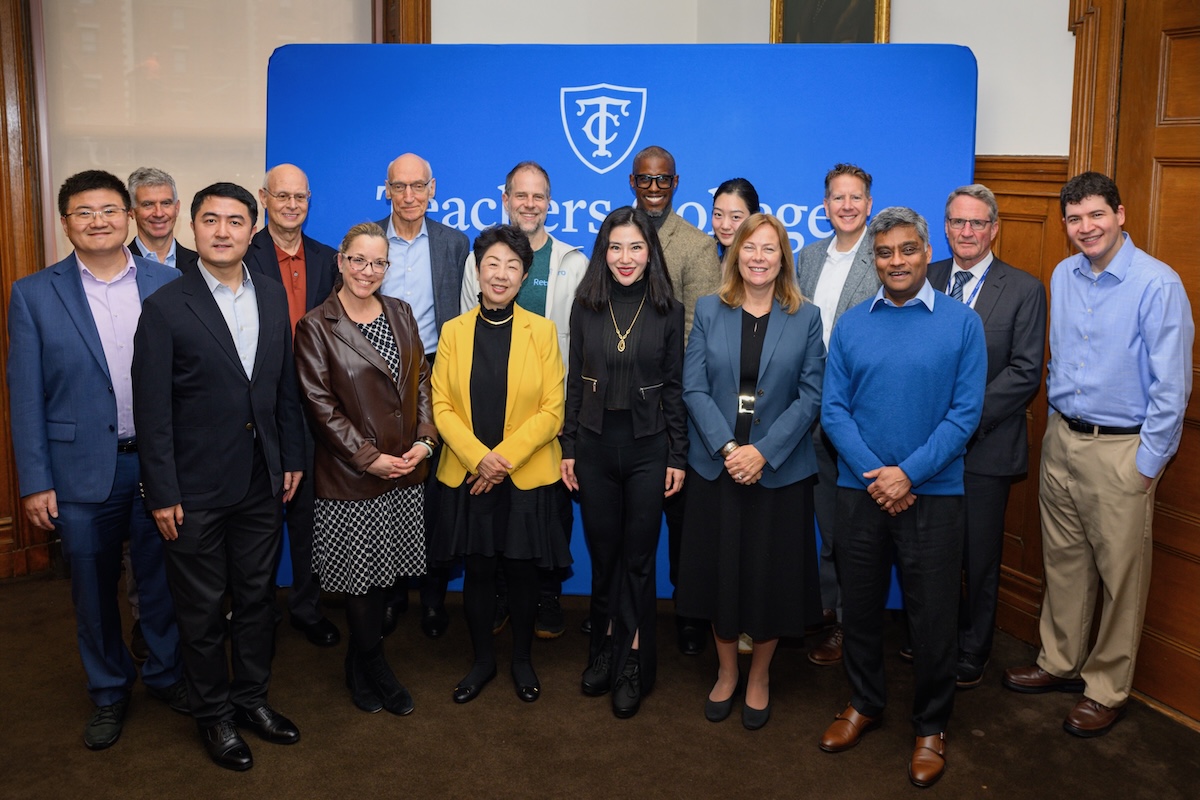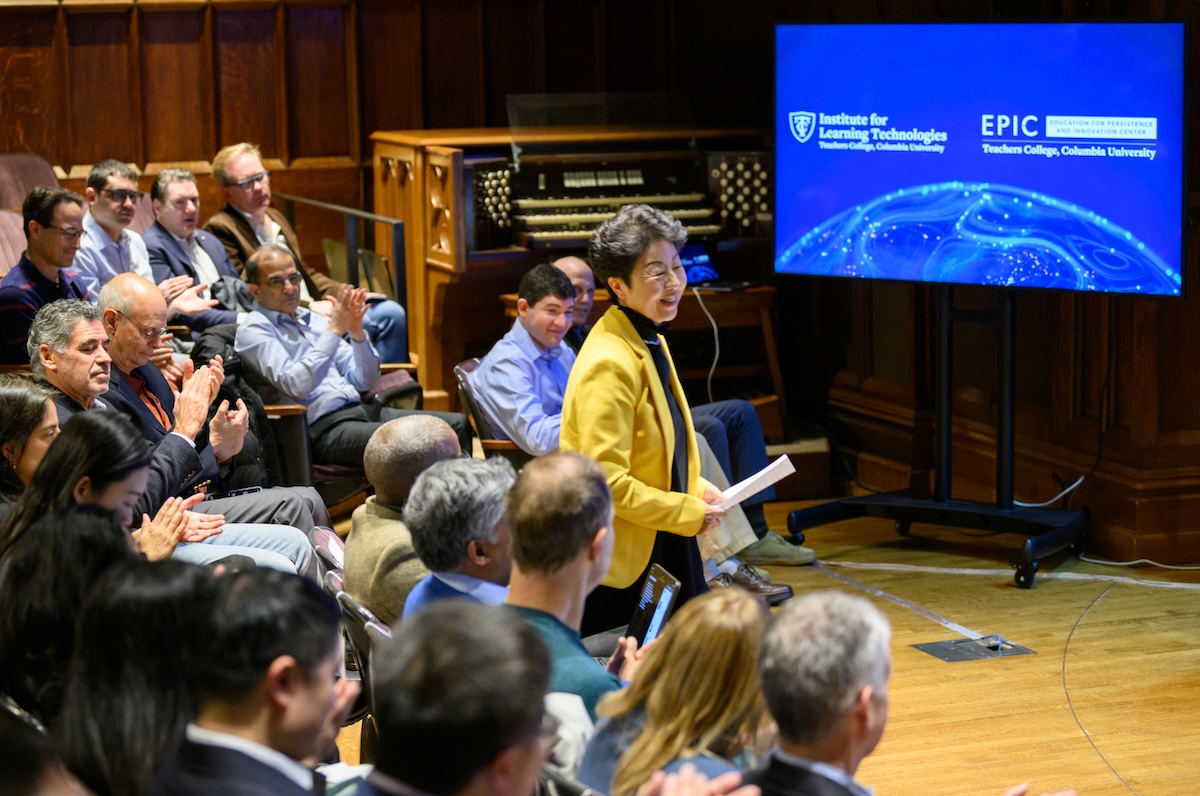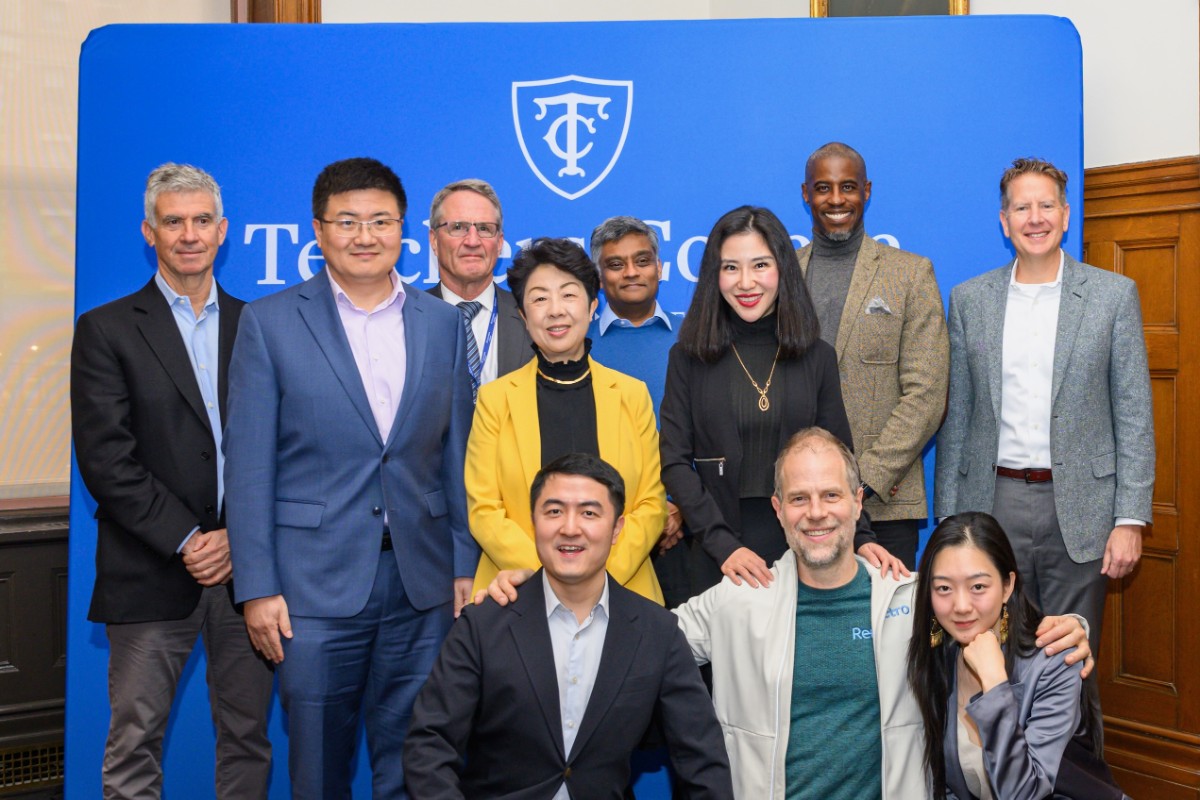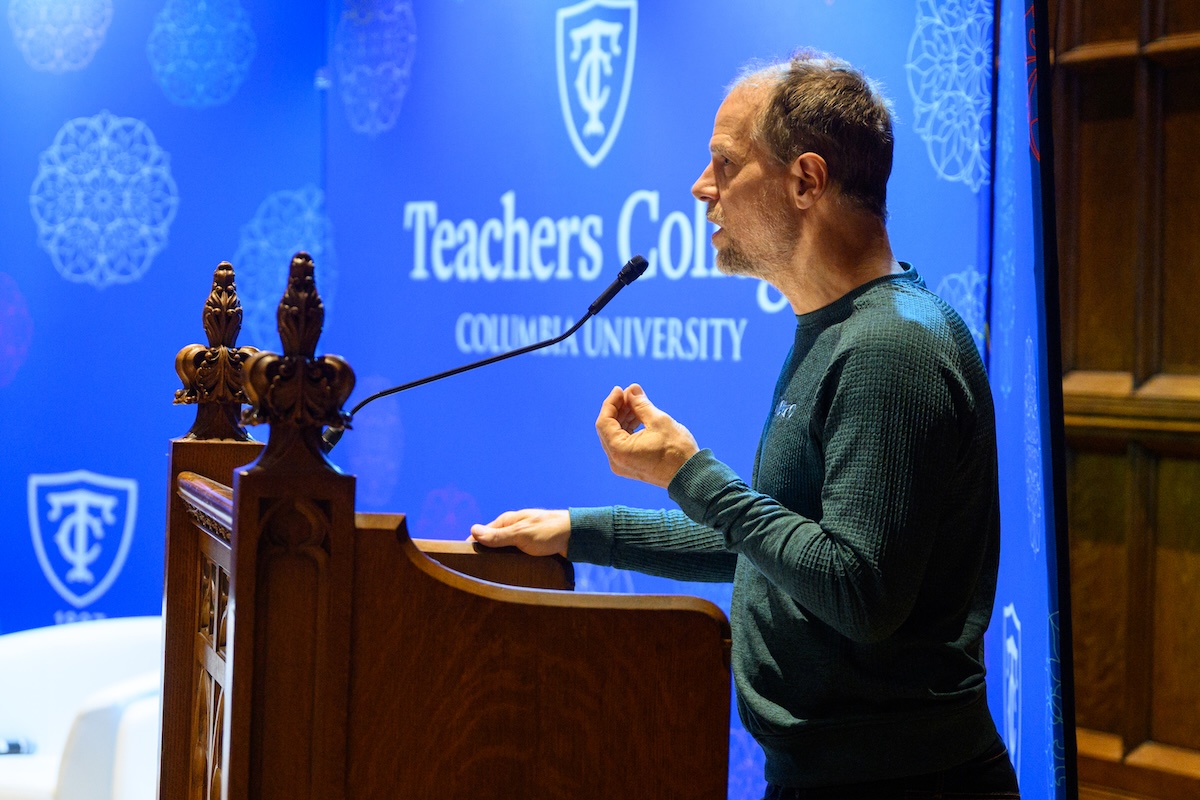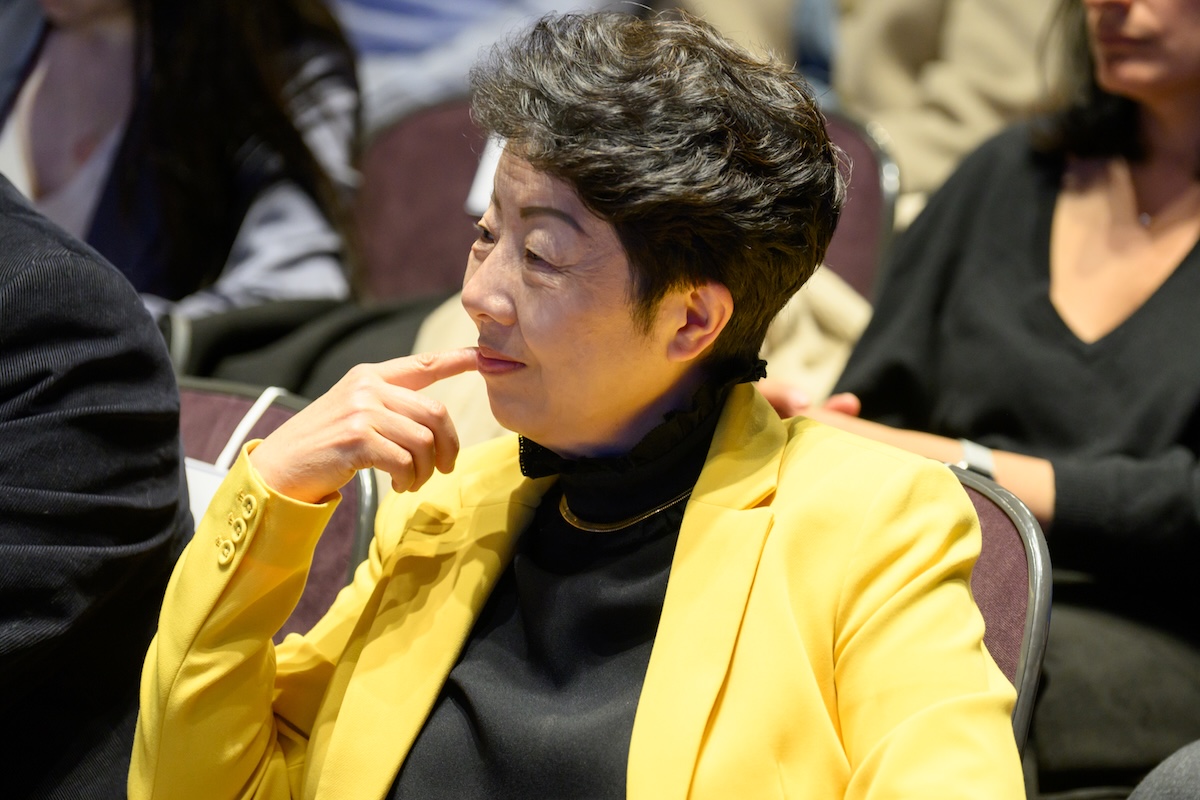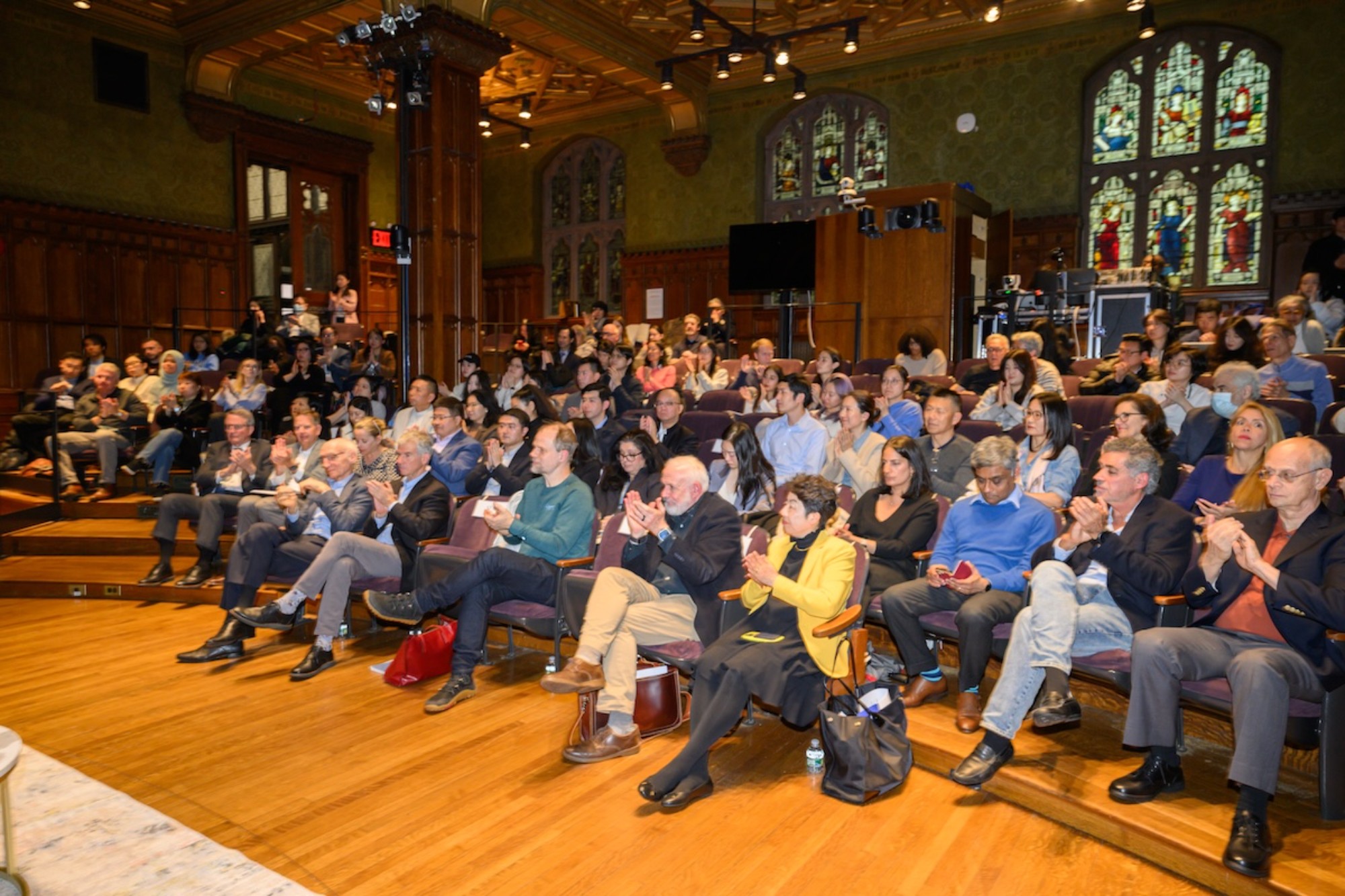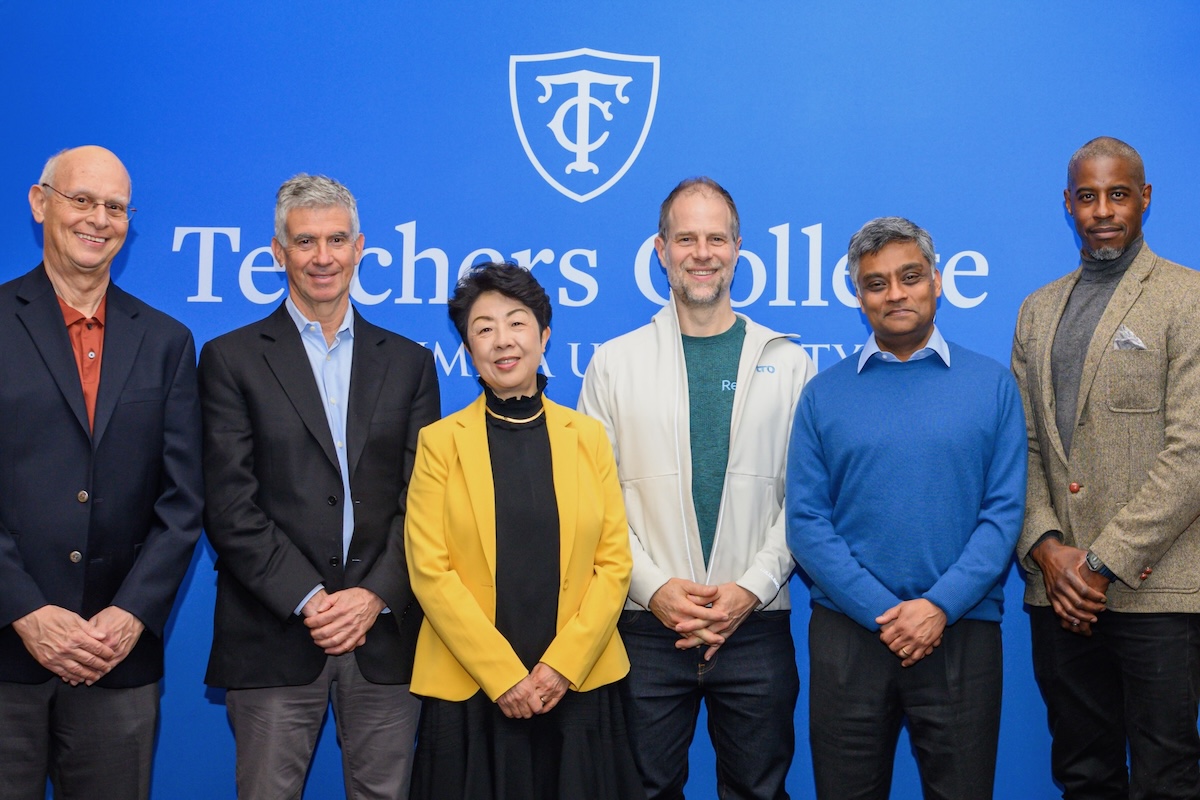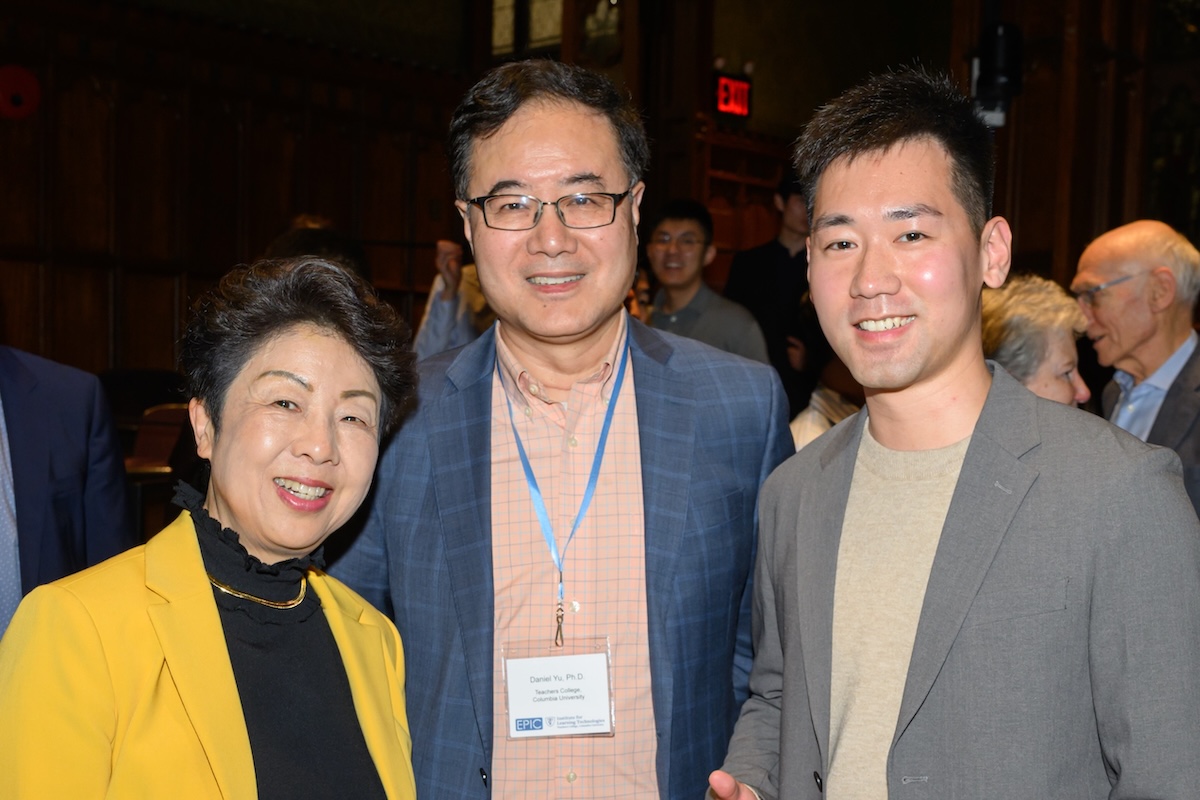TC’s Education for Persistence and Innovation Center (EPIC) and the Institute for Learning Technologies (ILT) brought together Joe Betts-LaCroix — founder and CEO of Retro Biosciences a bioengineering company backed by OpenAI CEO Sam Altman with the goal of extending the healthy human lifespan by 10 years — and experts in education, psychology, engineering and business at Teachers College for an afternoon of engaging discussion on the impacts artificial intelligence and increased longevity will have on education, motivation and well-being.
Spearheaded by Xiaodong Lin-Siegler, Cleveland E. Dodge Professor of Cognitive Science in Education and Founding Director of EPIC, the April event featured remarks from TC leadership and Betts-LaCroix, as well as a fireside chat and follow-up discussion with a small group of leaders in business, education and medicine.
In a lively and thought-provoking fireside chat moderated by actor and educator Ahmed Best, longevity innovator Joe Betts-LaCroix engaged in a dynamic conversation with three leading scholars: Robert Siegler, Jacob H. Schiff Foundations Professor of Psychology and Education at Teachers College; Garud N. Iyengar, Professor of Industrial Engineering and Operations Research and Avanessians Director of Columbia’s Data Science Institute; and Stanford’s Dan Schwartz (Ph.D. ’93, M.S. ’88), I. James Quillen Dean and the Nomellini & Olivier Professor of Educational Technology.
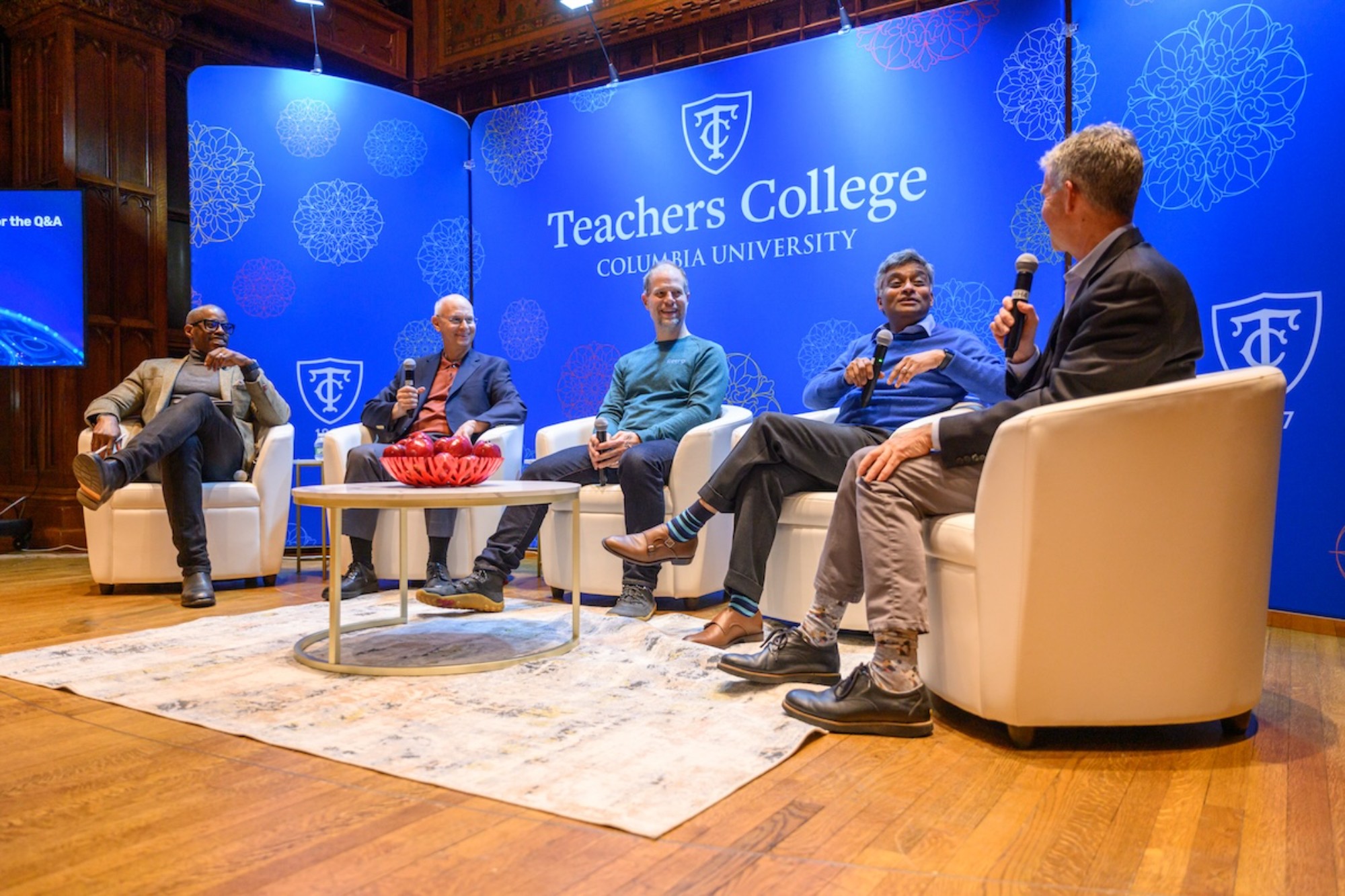
From left to right: Moderator Ahmed Best, Robert Siegler, Joe Betts-LaCroix, Garud N. Iyengar and Dan Schwartz (Photo: Nina Wurtzel)
Together, they tackled a provocative question: If people live to 120, how must our approaches to parenting, education and personal motivation change? The panel explored how the prospect of radically longer lives disrupts familiar timelines — childhood, schooling, career and retirement — and demands new models for sustaining curiosity, drive and learning across many decades. How do we avoid burnout over a 70-year career? What habits or mindsets prepare young people to adapt and evolve over a century of change?
For Betts-LaCroix, the question of longevity is inseparable from the question of meaning. "If you know you’re going to be around for another 20 years," he has remarked elsewhere, "you should make some choices that affect the world you want to live in." He challenged the common fantasy of spending extra years lounging by a pool. Instead, he argued for rethinking what vitality and contribution could look like at every life stage. Extended life, he suggested, should not be a passive stretch of time but an invitation to reinvention — whether that means launching a new career at 70, learning a new language at 80, or helping solve major global challenges in your 90s.
The panel discussed how to foster the kinds of motivation and personal resilience needed to thrive across this expanded lifespan. How do we keep people not just alive, but intellectually and physically engaged? Betts-LaCroix emphasized that growth doesn't stop unless we let it. His own work at Retro Biosciences focuses on cellular rejuvenation technologies, but his larger point was psychological: if the body can be made younger, then so can ambition, creativity and purpose.
Betts-LaCroix and the panel explored the impacts longer lifespans will have on education, careers and failure, sparking a provocative question from Iyengar, an engineer and data scientist: “[Our] lifespan has already increased from, say, 60 to 80… [when] do we start educating children differently?”
In response, Siegler, whose research centers on how children learn mathematics, honed in on the importance of lifelong learning and the failure research coming from EPIC. “We [educators] don't do much to prepare people to deal with failure. It's not in any curriculum I've seen...and a huge challenge for all of us interested in education is to motivate a greater percentage of people to keep learning new things [despite risks of failure].”
Lifelong learning also has a powerful effect on the brain as it ages, according to Schwartz, Halper Family Faculty Director of the Stanford Accelerator for Learning. “Knowledge is [an] important protective factor,” he said, referencing a study that compared knowledge recall of baseball for young people and octogenarians. While processing speed was faster for younger participants, it was the older baseball fans who performed the best. “When you age, different things fall apart [like] your ability to think quickly. [But expanding your] knowledge is going to make a difference.”
AI, in this context, wasn’t treated as a disruptive threat but as a potential enabler — offering tools for faster feedback, deeper learning and more efficient experimentation throughout life. With lifespans doubling, the challenge is no longer just how long we live, but how well we use the extra time.
Lin-Siegler and the panelists then joined a small group of 35 experts to further explore and brainstorm innovations surrounding AI, cognitive science, emotion and motivation, with incisive reflections provided by Schwartz, James Chou, Managing Director of Microsoft for Startups North Asia Region, and Craig Smith, Surgeon-in-Chief at Columbia University Medical Center.
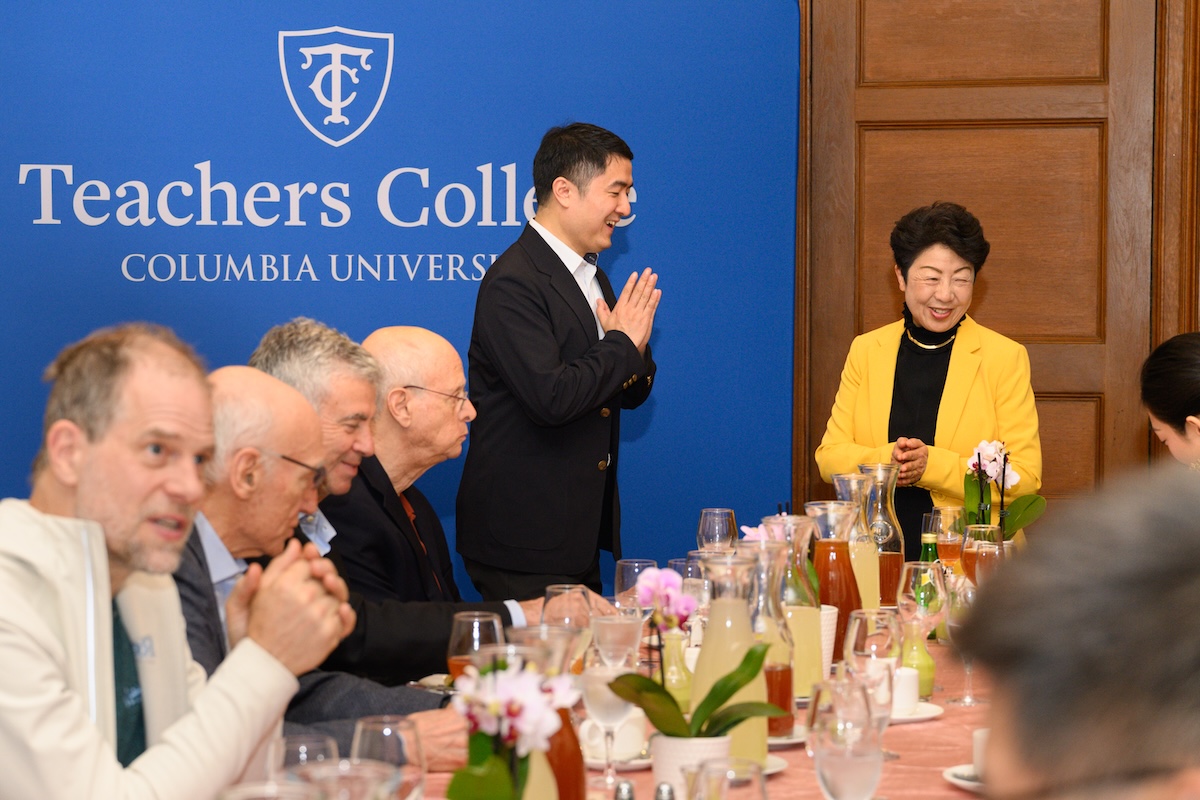
Lin-Seigler greeting participants at the follow-up discussion after the fireside chat (Photo: Nina Wurtzel)
In a series of bold, forward-looking flash talks, leading thinkers and innovators shared how science, technology and psychology can help individuals not just survive, but thrive in a future of rapid change, longer lives and inevitable setbacks.
- Drawing on two decades of research, Lin-Siegler presented a bold yet practical idea: failure is not a generic life lesson but a deeply personal turning point. Based on interviews with world-class achievers, she identified six psychological practices that help people turn setbacks into growth. She argued that, with the help of AI, we can move beyond vague advice like “be resilient” and deliver precise, personalized feedback tailored to each individual’s failure experiences, emotional responses, and coping patterns. In a future where careers, health and education may span many decades, mastering how to overcome failure — with the aid of AI — is not optional. Without it, longer lives may only prolong self-doubt, not fulfillment.
Throughout the day, speakers examined how failure has been a critical part of their journey to success. These narratives are often shared by highly successful individuals, according to more than a decade of research on failure and persistence at EPIC. “What we’ve found time and time again is that the highest achievers don’t just persist through failure — they interrogate it,” explained Lin-Siegler. “They use it as a tool. They analyze it, extract lessons from it and reinvent their approach until they succeed.”
These findings align closely with Betts-LaCroix’s own perspective toward failure and success. “I would like us to have a more nuanced way of talking about failure…half the time you should be failing,” he said during his remarks before the panel. “If you're trying something and you have a 99.9 percent chance of succeeding, you're not really trying [and] you're probably not going to be learning very much.”
Betts-LaCroix applies this philosophy to his work at Retro Biosciences. In fact, one of the first things new hires to the company learn is that failure is a central, recurring part of the experimental process.
This isn’t just a research and development strategy — it’s a worldview that connects deeply with research coming out of EPIC showing that while failure can be painful in the short term, it is often the most essential ingredient in long-term success.
- William Brian Gormley, Director of Neurosurgical Innovation at Mass General Brigham and Associate Professor at Harvard, extended the conversation into health. He presented Pison’s AI-powered wearable sensors that detect subtle neuromuscular signals, capturing motor intention before movement occurs. This hands-free, thought-driven interface opens a non-invasive window into attention, cognitive load, and brain-body communication. Gormley emphasized that advanced sensors and AI will enable personalized health insights, much like Lin-Siegler’s individualized emotional strategies — paving the way for earlier interventions and longer, healthier lives.
- Kang Lee, Professor of Applied Psychology and Human Development at the Ontario Institute for Studies in Education, confronted another challenge: the difficulty machines face in accurately reading human emotions. He revealed the promise of transdermal optical imaging — a cutting-edge technology that can detect micro-changes in skin blood flow, revealing emotional and physiological states invisible to the naked eye. Lee’s work underscored a future where emotional health, like physical health, could be more precisely understood and where deeper emotional feedback could help people better manage the psychological blows of failure.
- Tony Crescenzo, President and CEO of Intelligent Waves, brought the conversation to cognitive performance. He showcased Peak Neuro™, an AI-powered tool that uses audio neural entrainment to strengthen cognitive function, improve sleep, accelerate learning and sharpen focus. Crescenzo’s work pointed to a future where technology could help individuals not only recover from setbacks but rebuild stronger minds capable of sustained growth over longer and more demanding life spans.
Throughout the afternoon, a powerful, consistent message emerged: failure is why innovation is possible, it is the raw material for building long-term success. “The notion of thriving through failure is an essential area of study here at the College,” observed President Thomas Bailey in his welcome remarks, setting the tone for the day’s programming. “Even the most accomplished individuals experience profound failure — but they don’t treat failure as a verdict. They treat it as an experiment — one that didn’t yield an answer yet.”
Whether through personalized emotional strategies, individualized health data, cutting-edge emotion detection, or cognitive optimization, the speakers made clear that AI is critical for innovation — helping each person to confront hardship more wisely, recover more fully and ultimately, to live not just longer lives, but better ones.
And persistence through failure is useful not just for individuals but also institutions, noted Provost KerryAnn O’Meara in her closing remarks. “We always talk about this place as a place of firsts [and] things we tried that failed are not [often] part of the story,” said the Vice President for Academic Affairs, Dean of the College and Professor of Higher Education. “I like the challenge we were given to think about how TC might get out of our comfort zone and [consider] what would good failure look like for us?”

